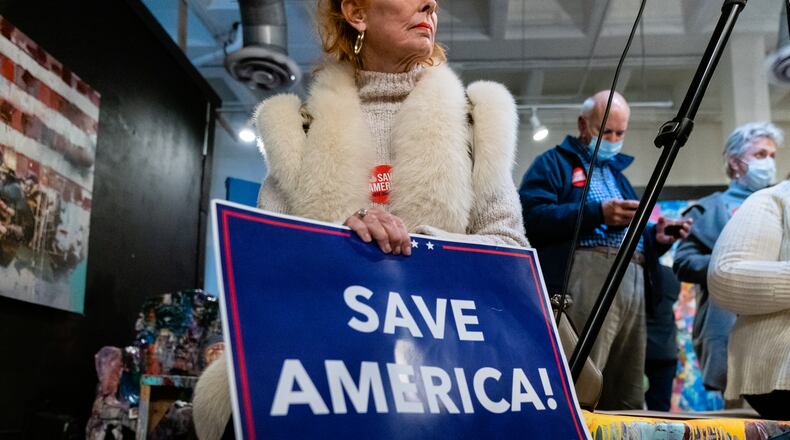Judging by its frequency, David Perdue’s most effective TV spot has the Republican senator staring straight at the camera, with the trace of a sad smile on his face.
He enumerates the consequences should he be defeated by Democrat Jon Ossoff next week. “Illegal immigrants — voting. Police — defunded. Taxes — sky high,” Perdue says, shaking his head ever so slightly. His list is long — but not long enough to include a mention of the COVID-19 pandemic.
Ultimately, Perdue comes to the slogan that he, Senate runoff partner Kelly Loeffler and their allies have leaned on for the last eight weeks. “We win Georgia, we save America,” he says.
A threat soft-pedaled on TV becomes more explicit on the stump: The end of GOP rule in the U.S. Senate is the end of America itself.
“They’re moving at warp speed. They’re going to put high taxes on us, open borders, Green New Deal, if we don’t hold the line in the Senate. You just got to do it,” Loeffler told supporters on Monday at a joint rally with Perdue in Greensboro, Ga. Loeffler faces the Rev. Raphael Warnock, a Democrat she constantly describes as a “radical liberal.”
Both Republican incumbents are using dressed-up versions of the apocalyptic language that has marked Donald Trump’s presidency, beginning with an inaugural speech that invoked “American carnage” — and reaching an apex with this summer’s assertion that a Joe Biden presidency would “destroy our suburbs.”
We are all familiar with references to the Apocalypse. The end times are an integral part of the Christian tradition, emphasized by some denominations more than others.
Nor are claims of existential danger limited to one political party. In 2016, one month before her presidential defeat, a quote from Democrat Hillary Clinton also served as a New York Times headline: “I’m the Last Thing Standing Between You and the Apocalypse.”
Google will tell you that the phrases “climate change” and “the end of life as we know it” have appeared together more than 2.8 million times on the internet.
Certainly, there are cases when apocalyptic language is warranted. Former Georgia senator Sam Nunn built a second career around securing the “loose nukes” of a collapsed Soviet Union. Nunn has earned his license to tell us when humanity appears headed for total self-destruction. And he uses it with discretion.
On the more pedestrian level of American politics, images of a world on the brink serve as both tool and mindset. Fear opens wallets. It drives voters to the polls. It smothers dissent within the challenged group. And it is most often used by those on the defensive — who emphasize preservation of the status quo above all else.
This is where Republicans are in Georgia and beyond. Years from now, political scientists will still cite the reelection campaigns of Ronald Reagan in 1984 and Donald Trump in 2020 as philosophical bookends of the modern GOP.
Reagan’s “Morning in America” message was the gauzy optimism of a Republican party on the rise. The existence of tomorrow was a given. Trump and his supporters/successors describe a nation at twilight. They might be compared to a line of fatalistic Roman troops making a last stand against a barbarian horde — were it not for the inconvenient fact that, months ago, Kelly Loeffler decided that she identifies with Attila the Hun.
But the danger of embracing the notion of a nation on the edge of collapse is that it can become a self-fulfilling prophecy. In November 2016, Alison McQueen, an assistant professor at Stanford University, penned a piece for Foreign Affairs magazine — recently expanded into a book — on the apocalyptic language of the just-finished presidential campaign.
Civilization-crumbling worldviews, McQueen wrote, have only three outcomes — “all of which are extremely dangerous.”
One reaction is withdrawal — or secession. And indeed, earlier this month, former Florida congressman and current Texas GOP chair Allen West suggested that red states band together to form a new “union.” The press release carefully avoided the word “confederacy.”
A second response is resignation and defeatism. Paralysis, rarely a good answer to a real crisis, sets in.
Then there’s Door No. 3. “A full-throated embrace of the apocalyptic worldview — one that divides the world into good and evil, vilifies opponents, and pushes the battle for ultimate justice to its violent consummation,” McQueen wrote.
The prize that comes with Door No. 3 is permission to do things that would otherwise be out of bounds. Compromise goes out the window, because institutional solutions are no longer the goal. Followers feel free to gun up and talk of civil war. Maybe one sends a few pipe bombs through the mail. Another might take aim at a group of congressmen playing baseball.
And their leaders? On the Trump side, they will feel free to ignore the results of a legitimate election and advocate the nullification of votes cast by fellow citizens of their own state. They will urge the vice president of the United States to overturn the votes of the electoral college on Jan. 6. To what end doesn’t matter. If there is no tomorrow, there are no consequences.
Post-Trump, Republicans will need to find a way to revive that Reagan-era belief in tomorrow. Because win or lose next Tuesday, Wednesday will surely follow — and this country will survive.
About the Author
The Latest
Featured




